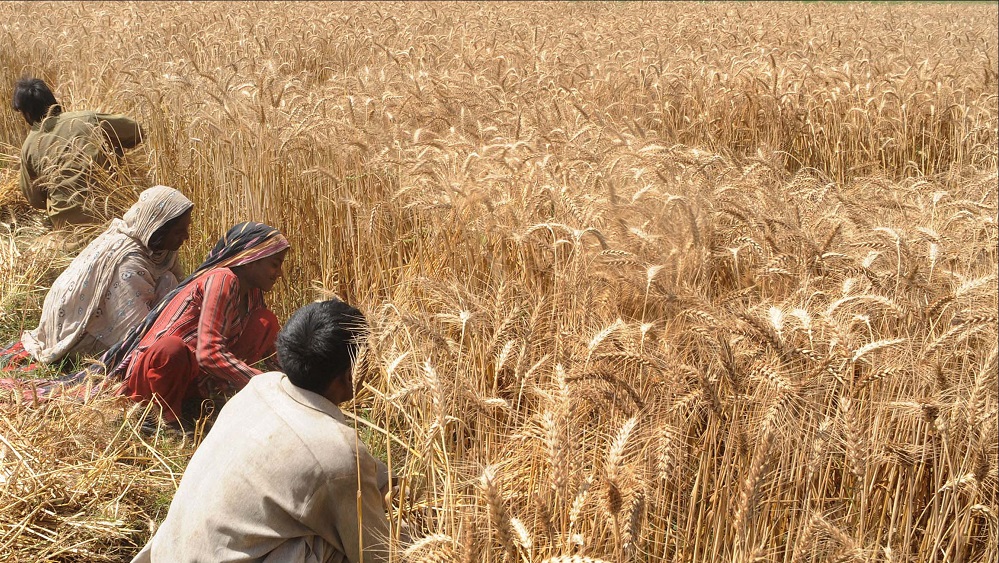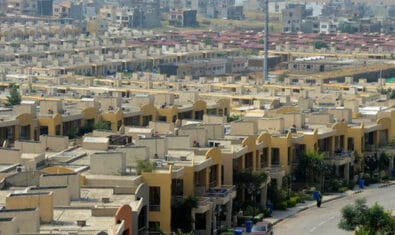It is a global phenomenon now. Villages are quickly vanishing. Green fields are ceding space to residential and commercial units while natural habitats and ecosystems are being engulfed by dark concrete, endless webs of asphalt, and thick clouds of poisonous smoke. Man is blinded by the shimmer of material success while his home – the only habitable planet, is being eaten away by climate change-triggered natural disasters, largely of his own making.
Agricultural land lost to residential and commercial centers is indicative of profound failures of a system that renders food production far less lucrative than transforming farmlands into sprawling real estate projects. It is reason enough for more and more farmers to reportedly opt out of farming in a country that is already facing extreme inflation and food security issues.
This Kissan Day – first initiated by Sarsabz Fertilizers and coopted by the Government of Pakistan to be celebrated each December 18 – there is a dire need to look into the plight of Pakistani farmers who are caught between the nature’s wrath and the apathy of system without a way out, but their misfortunate is not theirs alone rather has dire ramifications for everyone.
Pakistan’s Agriculture Potential
Pakistan is an agrarian economy with the agriculture sector contributing more than PKR 66.95 trillion which is equal to nearly 23 percent of the country’s annual GDP. The sector can be divided into four sub-sectors, including Crops, Livestock, Fisheries, and Forestry which contribute PKR 5249 billion, 9400 billion, 214 billion, and 328 billion to the economy respectively. The country has 56.53 million acres of cultivable land but only 38.64 million acres (68%) are cultivated with 32% remaining untapped.
With so much potential and ever-growing need for food and agricultural products, why farmers don’t feel incentivized to till their lands and grow crops? Or produce dairy? There are a plethora of issues that mar Pakistan’s agricultural sector.
Climate Change
Pakistan is amongst the top ten countries adversely affected by climate change. The heavy lashing of Monsoon rains and flooding this year caused irreparable losses to the sector. As per the Ministry of National Food Security and Research, the floods affected more than 8 million acres of crops, including rice, cotton, pulses, oil seeds, and vegetables, and destroyed millions of acres of agricultural land. Floods not only destroyed the Kharif crops but continue to threaten the upcoming Rabi crops as well because flood waters still stand on large swathes of farms and cultivable land. The situation triggered an immediate shortage of fruits, vegetables, and grain across the country, with Pakistan looking to Iran and other countries for imports of basic food items.
Climate change forces the agricultural sector to oscillate between facing acute shortages of water in one season to being inundated in the other. With such uncertainty on the cards, farmers are wary of investing in seed, fertilizer, equipment, and labor to till and sow the lands in hope of a good yield. Whatever water is available is not fairly distributed due to the lack of a centralized water management authority. With over 60% of the rural population relying on subsistence farming these are ominous tidings for the country’s economy and social well-being.
Lack of Agricultural Facilities
Pakistan cultivates only 68 percent of its total cultivable land opposed to over 80 percent by India, due to a lack of proper agri- infrastructure and facilities. One of the most pressing issues is the lack of storage facilities which forces farmers to sell their crops at much cheaper prices than they could get with a bit of bargaining power. It impacts their financial well-being and ability to finance agricultural inputs for the forthcoming season. The issue is further compounded by a large majority of farmers’ lack of financial literacy and access to finance, which leads to their exploitation by middlemen.
Policy and Regulatory Issues
Where would the farmers go to seek redresses, when the sector is plagued by policy loopholes and regulatory incompetency? The system governing the agricultural sector has a serious lacking of meaningful planning and resolute commitment to set order to the affairs, despite a constant decline in agricultural output and looming food insecurity.
The solutions to all the issues mostly involve political willpower to reform and rejuvenate the sector to incentivize farmers so they can feed the nation. The government must commit to drastic reforms in policy and regulatory regimes and undertake meaningful measures to advance and modernize the sector to help increase the yield.
Fatima Fertilizer – the proponents of Kissan Day in Pakistan – champions modernization of Pakistan’s agri-sector through tech-based innovation and through the promotion of Agri and financial literacy amongst farmers. The company started its groundbreaking Sarsabz Mobile application platform to provide timely and customized agricultural advisory to help increase crop yield for small-scale farmers. It is the first and only private organization to provide free-of-cost water and soil testing facility to help farmers take informed decisions and make the most of their hard labor and duteous nurturing.
These are some of the best practices that can be replicated on a large scale across the country to reach out to more small and large-scale farmers to help the agriculture sector attain its full potential. It will not only boost the financial health of our farmers and tackle our food security woes but add handsome revenues to our national exchequer. So this Kissan Day, we should commit to strengthening and rejuvenating our agricultural sector or more aptly our lifeline.
About The Author
Sher Zaman Khan is a communications specialist who writes on diverse subjects, including the environment and climate change.


























